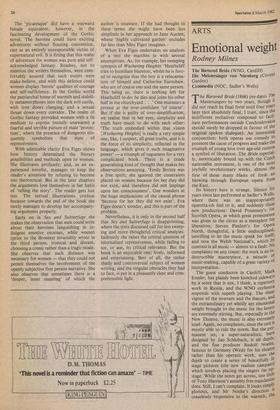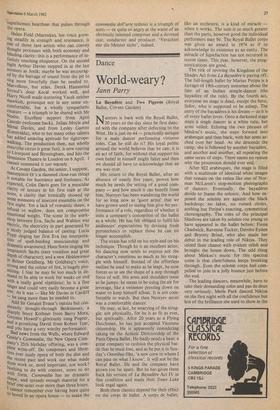ARTS
Emotional weight
Rodney Milnes
The Bartered Bride (WNO, Cardiff) Commedia (NOC, Sadler's Wells)
The Bartered Bride (1866) pre-dates The Mastersingers by two years, though it did not reach its final form until four years later (not absolutely final, I trust, since the indifferent recitatives composed to facil- itate performances outside Czechoslovakia should surely be dropped in favour of the original spoken dialogue). An interesting conjunction: both operas use comedy to promote the cause of progress and make the triumph of young love over age-old custom a symbol of liberation. The Bride especial- ly, inextricably bound up with the Czech nationalist movement, is one of the most joyfully revolutionary works, almost the first of those many blasts of fresh air blowing through European opera from the East. Its history here is strange. Silence for years since last performed at Sadler's Wells, where there was an inappropriately operetta-ish feel to it, and suddenly three new productions: David Pountney's for Scottish Opera, in which great prominence was given to the circus as a metaphor for liberation; Steven Pimlott's for Opera North, thoughtful, a little undisciplined, unwilling to let the music speak for itself; and now the Welsh National's, which by contrast is all music — almost to a fault. No complaints on any count: the work is an in- destructible masterpiece, a miracle of music-making, capable of a great variety of interpretation. - The guest conductor in Cardiff, Mal* Ermier, has plainly been knocked sideways by a score that is not, I think, a repertory work in Russia, and the WNO orchestra responds with superb playing. The she vigour of the overture and the dances, and the extraordinary yet wholly apt emotional weight brought to the music for the lovers are extremely stirring. But, especially in the New Theatre, the music is also extremely loud. Again, no complaints, since the cast is mostly able to ride the storm. But the per- manent set, a super-naturalistic bar° designed by Jan Schlubach, is all dePth, and the fine producer Rudolf Noelte, famous in Germany (West) for his theatre rather than his operatic work, uses the depth to create a series of beautifully lit stage pictures (the new realism rampant) which involves placing the singers far up- stage. While the notes get across, too little of Tony Harrison's amiably free translation does. Still, I can't complain. It looks simPlY glorious, and Mr Noelte's direction is ceaselessly responsive to the warmth, the
superhuman heartbeat that pulses through the opera.
Helen Field (Marenka), her voice grow- ing steadily in strength and resonance, is one of those rare artists who can convey thought processes with both economy and blinding clarity: this is a performance of in- finitely touching eloquence. On the second night Arthur Davies stepped in at the last moment as Jenik; maybe he was encourag- ed by the barrage of sound from the pit to sing more forcefully than he needed to. Marvellous, but relax. Derek Hammond Stroud's dour Kecal worked well, and Harry Nicoll made stuttering Vasek neither mawkish, grotesque nor in any sense un- comfortable, but a wholly sympathetic creature — a triumph to be shared with Mr Noelte. Excellent support from April Camel° (welcome back), Julian Moyle and Menai Davies, and from Lesley Garrett (Esmeralda), who to her many other talents has added amazing aptitude for tightrope- walking. The production then, not wholly ernst (the circus is great fun), is now touring to Liverpool and Birmingham, and hits the dominion Theatre in London on 6 April. I cannot commend it too warmly. At Covent Garden, the senior, I suppose, masterpiece (it's a damned close-run thing) is notable for buoyancy and freshness. As expected, Colin Davis goes for a muscular clarity of texture in his first stab at the score, a clarity that ironically showed up some moments of insecure ensemble on the first night. Yet a lack of romantic sheen, a refusal to wallow, does not compromise emotional weight. The scene in the work- shop between Eva, Sachs and Walther was electric, the electricity in part generated by a nicely judged balance of casting: Lucia PoPP singing her first Eva (an interpreta- tion of spell-binding musicianship and dramatic awareness); Hans Satin singing his umpteenth Sachs (easy vocalism and great depth of character); and a new Heldentenor in Reiner Goldberg. Mr Goldberg's voice, strong and the colour of fire, is hugely pro- inising. I fear he may be too much in de- mand to be able to work for weeks on end with a really good repetiteur: he is a fine singer and could very easily become a great one. As it was — like Mr Davies in Cardiff
he sang more than he needed to.
Add Sir Geraint Evans's outsize but con- sistently thought-through Beckmesser, a sharply bossy Kothner from Barry Mora, CwYnne Howell's,gloriously sung Pogner, and a promising David from Robert Tear, and you have a very worthy performance. Had news from the Wells, where Edward Cowie's Commedia, the New Opera Corn- Pany's 25th birthday offering, was a com- Plete write-off. Do composers and libret- tists ever study opera of both the dim and the recent past and work out what made ,,them work or, more important, not work? INothin-
6 to do with content, more to do
With form. Commedia has no dramatic Shape, and spreads enough material for a brief one-acter over more than three hours. I Cannot remember ever having been quite so bored in an opera house — to make the commedia dell'arte tedious is a triumph of sorts — or quite so angry at the waste of an obviously talented composer and a devoted cast, conductor and producer. `Verachtet mir die Meister nicht', indeed.







































 Previous page
Previous page